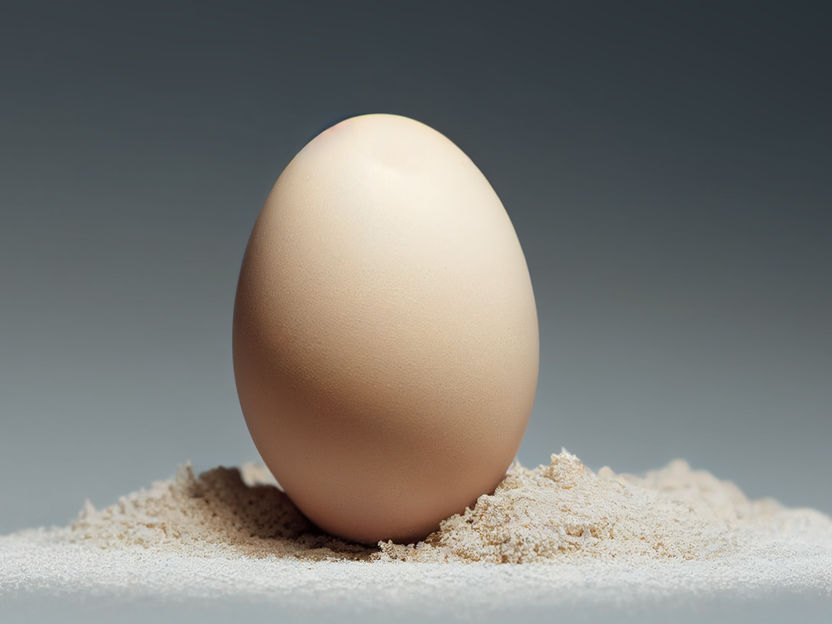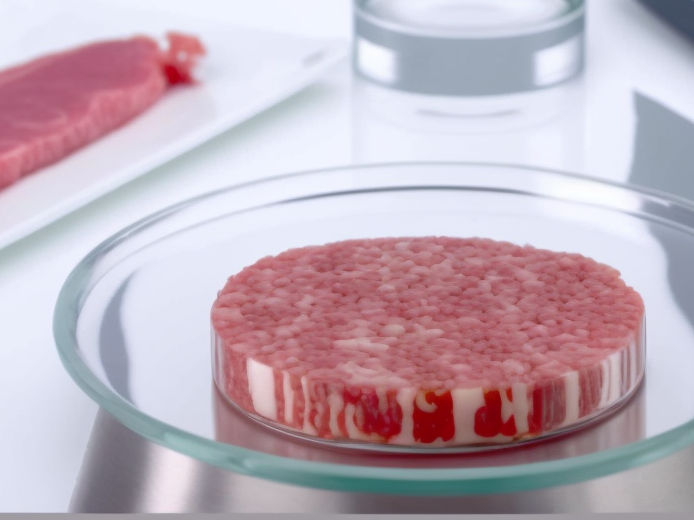Fight malnutrition with egg powder
Egg powder could help improve the nutritional situation of children in shortage areas. It has a long shelf life, is transportable and rich in nutrients.
malnutrition is a key challenge not only in African countries. As an international study led by Veronika Somoza now shows, egg powder is a food with great potential to improve the nutritional situation of children in deprived areas. Compared to pasteurized whole egg, the powder contains lower amounts of essential fatty acids, but still provides many vitamins, indispensable amino acids and important trace elements. In addition, it has a long shelf life without additional preservatives, is easy to transport over long distances and is simple to prepare.

Computer generated picture
According to the German Federal Ministry of Food and Agriculture, more than 250 million people in Africa alone are undernourished. Infants and children are particularly hard hit. "Studies show that adding one egg a day to complementary food can help reduce the incidence of underweight in older infants by 74 percent, as well as counteract the so-called 'stunting' effect," says Veronika Somoza, director of the Leibniz Institute of Food Systems Biology at the Technical University of Munich (LSB).
Egg powder a low-cost alternative?
In areas where malnutrition is part of everyday life, however, eggs are hardly available. Inexpensive egg powder could therefore be an alternative. Due to its minimal water content, it has a significantly longer shelf life as well as a relatively high nutrient density. In addition, it is easier to store and transport than eggs, and it can be easily added to food. This makes it interesting as a potential dietary supplement.
However, despite its widespread industrial use, little has been known about its nutritional quality. To fill this knowledge gap, the team led by Veronika Somoza conducted an extensive comparative study. Using state-of-the-art food chemistry analysis methods, they determined the nutrient profiles of three industrially produced, pasteurized whole egg batches and three egg powder samples produced from these batches. It then compared the determined nutrient profiles on a dry matter basis.
Egg powder not contaminated by heavy metals
"As our analyses showed, the drying process did not lead to an accumulation of the heavy metals cadmium, lead, arsenic and mercury," reports Philip Pirkwieser, a PhD chemist at LSB and lead author of the study. In addition, the research team observed little or no loss in total fat content, essential amino acid content, important trace elements or carotenoids. Likewise, vitamin E (alpha- and gamma-tocopherol) and vitamin B12 concentrations remained nearly constant. However, vitamin A (retinol) levels declined by 14 percent. The amount of vital omega-6 and omega-3 fatty acids even decreased significantly by an average of 39 and 61 percent, respectively.
"Despite the small loss of retinol, egg powder is a valuable source of vitamin A. Sub-Saharan African regions in particular could benefit from this. This is because vitamin A deficiency is widespread there and leads to a high prevalence of vision problems," explains Veronika Somoza. A daily intake of egg powder equivalent to one medium-sized egg is sufficient to cover 24 percent of a child's daily requirement for vitamin A, 100 percent for vitamin E, 61 percent for selenium and 22 percent for zinc, depending on age. This is very positive. If it were possible to increase the content of essential fatty acids and vitamin A, the great potential of egg powder as a food supplement could be fully exploited, the LSB director continues. One way to achieve this could be through chicken feed enriched with these fatty acids and vitamins.
Note: This article has been translated using a computer system without human intervention. LUMITOS offers these automatic translations to present a wider range of current news. Since this article has been translated with automatic translation, it is possible that it contains errors in vocabulary, syntax or grammar. The original article in German can be found here.
Most read news
Topics
Organizations
Other news from the department science

Get the food & beverage industry in your inbox
By submitting this form you agree that LUMITOS AG will send you the newsletter(s) selected above by email. Your data will not be passed on to third parties. Your data will be stored and processed in accordance with our data protection regulations. LUMITOS may contact you by email for the purpose of advertising or market and opinion surveys. You can revoke your consent at any time without giving reasons to LUMITOS AG, Ernst-Augustin-Str. 2, 12489 Berlin, Germany or by e-mail at revoke@lumitos.com with effect for the future. In addition, each email contains a link to unsubscribe from the corresponding newsletter.
Most read news
More news from our other portals
Last viewed contents
Döhler: Joint Venture with Afriplex - A joint venture for integrated ingredient solutions – Doehler and Afriplex consolidate strengths and activities in Southern Africa

Global Cultured Meat Markets Report - By 2040, a Projected 60% of Meat will be Created from Cells Grown Within Bioreactors and Sold Across Grocery Stores and Restaurants Worldwide

IL Metronic Sensortechnik GmbH - Ilmenau, Germany




























































